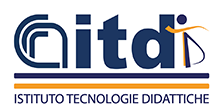WISE (coordinated by the ITD-CNR) is a national project funded by the Italian Ministry for University and Research within the FIRB programme
Framework
According to international literature on NBE the key issue in the educational action is personalization according to the knowledge needs of the learner and their learning style, with special attention to pedagogical, cognitive, technological and managerial aspects.
In SpEd such aspects are even more critical given the unique status of the student which, so far, has produced research work tailored on particular cases, thus leaving out unsolved problems such as:
- the lack of profiling approaches for the special student;
- the inadequacy of current ID methods for SpEd;
- the impossibility for current LMS to short-circuit the user and available resource on a semantic base.
Objectives
WISE aims at:
- developing a model for special student profiling to taylor adaptive SpEd systems dynamically;
- developing an ID model for SpEd along with a CAID system (Computer-Assisted ID);
- implementing SpEd-oriented functions on current LMS based on pedagogical agents, semantic gesture translators, content simplifiers;
- developing methods and procedures to measure effectiveness and spin-off of such models and technologies, integrated in an evaluation system based on international standards.
WISE will also design a network model of high scientific value and of support to professionals in the field of SpEd. It will include shared basic Knowledge/Content prototypes and semantic retrieval systems. The network is aimed at:
- promoting research activity on new educational technologies and methodologies able to fit each special student;
- favour NBSE large-scale sustainability;
- potentiate ITD-CNR through a synergic action with the various RUs and extending the network to homologous international initiatives.
Workplan
The WISE target is the homebound SpEd for school, university and adult education.
The research methodology focuses on the subject in order to design the most effective educational strategies for the student and the info-formative ones for operators. The following are other specific features of WISE:
- the results control through field experimentations with a research-user two-way interaction channel;
- a Steering Committee to reorient the project;
- a monitoring and evaluation system both at “micro” (single actions) and “macro” (the whole project) levels.
Expected results
WISE will yield:
- the SpEd research activity and services further development at ITD;
- a support system for the various SpEd actors, scientifically supported by the WISE network and including a portal, a monitoring and evaluation system to optimize and reorient the network activity and its strategies;
- NBE special application prototypes for:
- student-network communication (semantic gesture translation, simplifiers of content complexity, accessibility);
- new NBSE conceptual models based on the personalized access to materials and study activities through the knowledge/learner/educational modelling;
- a knowledge Base including also SpEd best practices;
- optimization of resources in education/training tayloring;
- NBSE self-training kits for stakeholders;
- stakeholders professional communities.
Since WISE outcomes pertain to such a complex context, they will certainly have a remarkable spin-off for current NBE and for other special contexts, i.e. restricted liberty conditions, foreign minors and adults who need education and vocational training.
 Italiano (Italia)
Italiano (Italia)  English (United Kingdom)
English (United Kingdom) 

